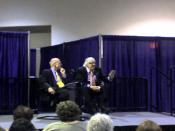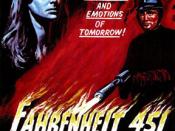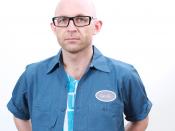Fahrenheit 451 Guy Montag seems to take great pleasure in his job, as clearly stated in the 1st sentence "It was a pleasure to burn"ÃÂ. He never really stops to think clearly about his actions or what effect they might have. Upon meeting Clarisse, he is thrown into puzzlement. Her innocent questioning and "anti-social"ÃÂ habits intrigue him, and slowly starts to realize how empty his life is. Bradbury's representation of the future is oddly familiar and some connections can be made to today. Such as "TV Walls"ÃÂ, flat screen TVs, or "seashell"ÃÂ radios, earphones. However, Bradbury still doesn't provide enough background on how the world came to be like this. Why is censorship so powerful? At 1st glance it seems everyone is in a futuristic Utopia. Everyone thinks they are happy and content. If this were true why would Mildred try to overdose on sleeping pills? See is described as half-alive and doesn't really care if see lives or not.
Her only concern is her TV "family"ÃÂ. When the Old Woman burns alive with her books, Montag shows a capacity for empathy and compassion that is uncommon in his society. At first, he feels highly uncomfortable, since he usually only has to deal with the lifeless books, without human emotions getting involved.
Montag has changed greatly in since the book began. Often prisoners who are released from jail after long sentences are "institutionalized"ÃÂ and unable to function in the real world. You would think the same would be true for Guy, but he seems fearless in challenging the system that has been his life. Bradbury's symbolism with the sand and the sieve is apparently reflecting Guy's struggle to find the truth. As it is often hard, almost impossible, to find the true meaning of something Montag yearns to share his thoughts with someone else here. As shown when he reads "Dover Beach"ÃÂ to his wife and her petrified friends. This causes emotional outbreaks from the women. I also am curious why Mildred covered for Guy, it just didn't seem like something she would do.
Mildred's betrayal was a very interesting twist in the book. I would have expected one of her friends to turn him in and not his own wife after she had covered for him. I'm sure she soon forgot about him after she was driven away. Beatty's literary knowledge is fascinating, it is very apparent he is a well educated individual, and very manipulative. I wish Bradbury had partially revealed what made Beatty hatred for books so strong.
Guy's escape is thrilling, and demonstrates how corrupt the "system"ÃÂ is with the fake death of Guy. I found the apocalyptic ending is strangely familiar to the one the Bible describes. In all I think the end was to a little too sudden. It's almost as if Bradbury took the easy way out by using an atomic holocaust.





